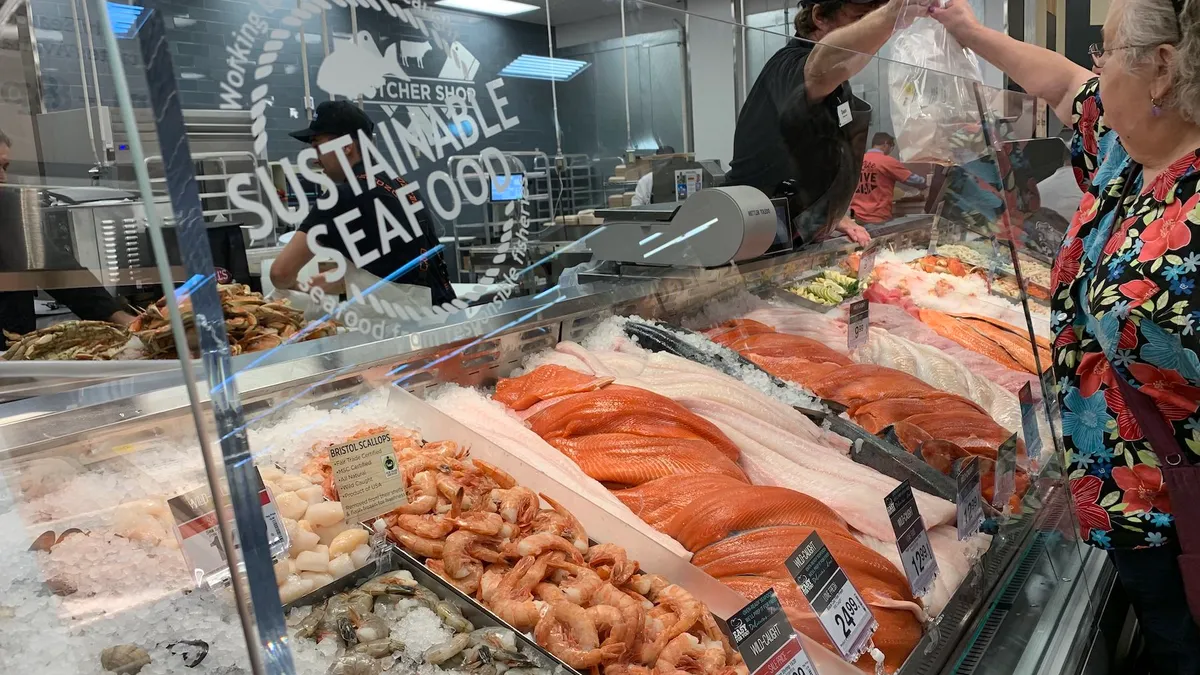Dive Brief:
- IBM Food Trust announced a partnership with Raw Seafoods Thursday to bring its blockchain platform to the seafood industry, starting with wild caught scallops, according to a press release emailed to Supply Chain Dive. The goal of the partnership is to improve visibility into sourcing, security and sustainability in the supply chain.
- "Frankly, it's something that we've been battling for many years, [maintaining] the credibility of the supply chain and the seafood industry" Daniel McQuade, vice president of marketing at Raw Seafoods, told Supply Chain Dive in an interview.
- Tracing the origin of wild caught scallops can take days, Rajendra Rao, general manager of IBM Food Trust said in a statement. Using blockchain, this process takes seconds and solves "three of the core consumer concerns that deter them from enjoying seafood: safety, sustainability and authenticity.”
Dive Insight:
The USDA estimates 80% to 90% Americans don't consume enough seafood in their diets. At a time when consumers are looking for environmentally sustainable alternatives to beef and poultry, McQuade says the seafood industry has an opportunity to use technology to turn that trend around.
Seafood producers often suffer from a lack of visibility into where their catch goes after it reaches the port, McQuade said. By giving producers, distributors, sellers and customers access to the same set of data via blockchain, he said it will improve business operations for the seafood industry and increase consumer demand by building trust.
McQuade said the lack of trust among American consumers often stems from fear that products aren't genuine, have been fraudulently substituted for a cheaper variety or food safety reasons.
Blockchain has worked particularly well for tracking agricultural products like lettuce or beef, McQuade said. Because they are located on farms, they can be produced in regular cycles. Seafood can be more challenging because the location and size of a catch can vary widely from day to day.
Using IBM's platform, McQuade said a fisherman can have software running on his ship's computer. In real time, "he can upload data to the IBM Food Trust platform, telling the location name, the name of the catch and the size of the scallops, the bag number, the number of pounds in the bag."
This is particularly important because according to the National Oceanic and Atmospheric Association, 80% of seafood coming into the U.S. is imported from elsewhere.
"Whether it's Salmon from Norway or it's shrimp from India or tuna from the Philippines, it goes through degrees of separation before you put it into your mouth and it may be four or five, six, seven degrees of separation," McQuade said. "There is where the problem lies. Do we trust every one of those those transactions that's going through the supply chain?"
As IBM Food Trust expands its 170 company membership, Offering Director Suzanne Livingston told Supply Chain Dive one of the most common challenges with bringing new members online is the inherent lack of traceability or even data collection in food manufacturing operations.
"When you go into a food company here in the U.S. and they receive goods, they may mix those goods and they may process those goods and remix them and repackage them," all the while, she said, they might not actually be keeping track of all their inputs.
Livingston said the increasing availability of IoT sensors, RFID tags and tracking software has helped to improve this and generate usable data that can automatically be integrated into IBM's system.
"So the parties who are part of [IBM Food Trust] can see end-to-end, including all the way to the consumer, who could scan that final product that they have at the restaurant or as a store, see where it originated from and pertinent information. That's really what blockchain is bringing together in the supply chain space."
Correction: A previous version of this story misspelled Suzanne Livingston's last name.













